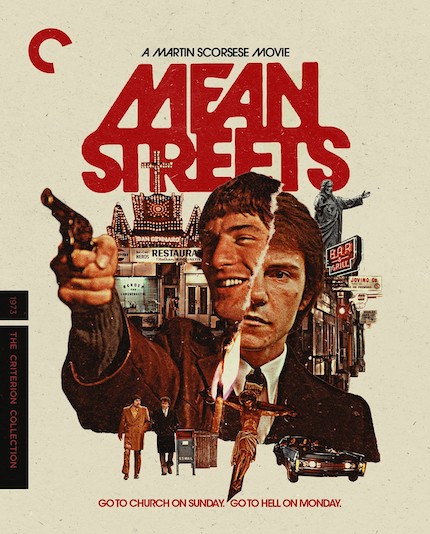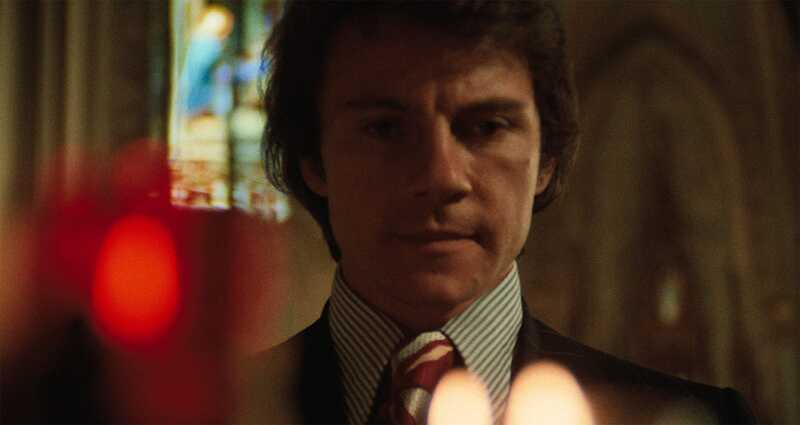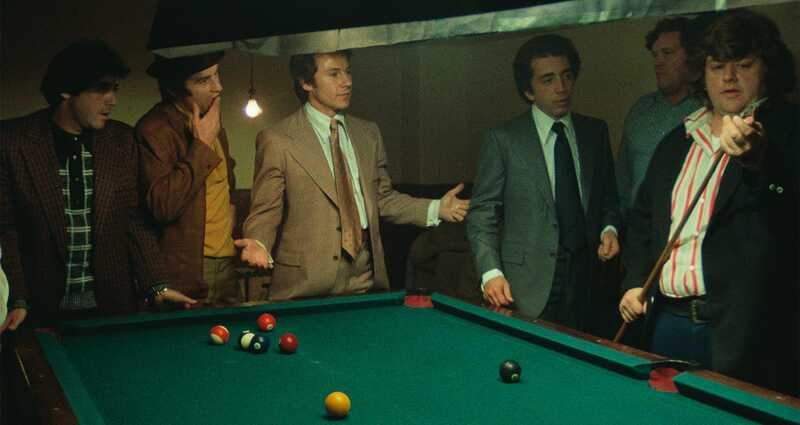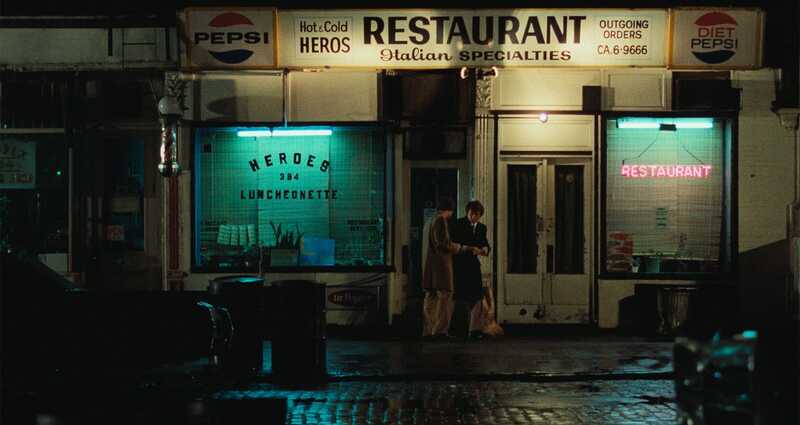MEAN STREETS 4K Review: Martin Scorsese Takes On His Home Turf
Robert De Niro and Harvey Keitel ignite Scorsese's breakthrough movie, now on 4K from Criterion.

“You don't make up for your sins in church. You do it in the streets. You do it at home. The rest is bullshit and you know it.”
It’s entirely fitting that these first uttered words in Martin Scorsese’s punchy urban crime drama Mean Streets are delivered by the filmmaker himself.
Scorsese has made no secret of his lifelong reconciliation with how, while growing up in an Italian neighborhood in New York City, he witnessed dangerous gangsters participating in mass on Sundays, then out committing crimes the rest of the week. What is this duality between worshipful penance and willful wrongdoing; right and wrong? The concepts are vastly apart from one another, yet so close in proximity… A fella could spend a long career hashing over these things…
Scorsese’s voice functions as part of main character Charlie Cappa’s (Harvey Keitel) deeply conflicted internal monologue. As Scorsese’s explained elsewhere, Charlie is a character who is “trying to be moral in a world that is not moral.” To quote the great singer/songwriter Kris Kristofferson as he was quoted two Scorsese features after this one: “He’s a walkin’ contradiction, partly truth and partly fiction.”
Charlie’s affection for the neighborhood screw-up/willful chaos agent Johnny Boy (a surging Robert De Niro, igniting the screen in this, his breakout role) is both the crux of his selfless virtue and his vulnerability. Johnny Boy has maxed out his options for borrowing money. Cut off by everyone but the upstart criminal Michael (the very recently departed Richard Romanus, better dressed than Charlie though just as conflicted), Johnny makes the mistake of letting him know that he’s “the only jerk-off” who will still lend him any money. Such exchanges do not end well in this hair-trigger world.
The film's title itself is derived from the writings of hard-boiled author Raymond Chandler. It’s a blunt, firmly direct title. Perhaps, though, it’s too direct? While this, Scorsese’s breakthrough (though not at all his first) film, indeed lands as a comprehensive down 'n' gritty immersion into the young Italian male experience in New York City pre-1973, its upward trajectory as a seminal work of “The Movie Brats” wave (watch any documentary about the Easy Riders, Raging Bulls era and you’re likely to see the iconic Mean Streets poster slam by during a montage of such early-70s confrontational cinematic ball-busters) is even more rooted in its busy layers of symbolism that are just waiting -- begging -- to be extrapolated.
Keitel’s Cappa, always sporting a fine suit and a look of discontentment, can’t help reaching to touch the flames at the alter while kneeling for mass. He’s well aware of his outsider’s puny-ness in the breadth of the immaculate interior setting. Yet, as long as the procedure is written, practiced, and passed down, so let it be done. Right…?
Later, he tells his girlfriend Teresa (an acute Amy Robinson) of a profoundly disturbing and sexually explicit dream wherein he ejaculated a barrage of blood, worthy of the elevator in The Shining. Well, she doesn’t like to hear about that. All the while, Mean Streets takes place during the festive overly electrical luminescence in the dark of the San Gennaro Feast, an annual Catholic public celebration that can’t help but visually evoke “Sin City” itself, Las Vegas.
----------------------------------------------------------------------
Criterion has released Mean Streets with a mostly outstanding new 4K digital restoration that’s been approved by director Martin Scorsese and collaborator Thelma Schoonmaker.
The 4K UHD disc (encoded with Dolby Vision HDR) has an uncompressed monaural soundtrack that excellently serves the film’s jukebox score of Motown and Rolling Stones singles. (From here, Scorsese and the Stones, both soulful yet “dangerous,” would famously roll on as simpatico cultural forces going forward). I say “mostly outstanding” only because, on my monitor (which I believe is properly configured) faces appear slightly blotchy during the scenes in the dark, saccharine-lit bar. By contrast, the same scenes don’t have that issue when viewed on the accompanying Blu-ray disc.
The Blu-ray disc contains a fine array of supplemental features both newly produced and vintage. First up is the audio commentary, with Scorsese and star (and future major film producer) Amy Robinson, originated from Warner Bros.' 2004 DVD edition. Here, the filmmaker gets into personal family details of his urban Italian American upbringing that so strongly informs the fabric of Mean Streets. He tells of how his NYU film schooling emphasized documentary filmmaking, which conflicted with his internal notions of wanting to become a director of Hollywood-style narratives. Mean Streets is of course neither but demonstrates strong aspects of both.
Another long detour in the director’s commentary involves the unsuspecting influence of Abbott & Costello and the Hope/Crosby “Road to” comedies on Mean Streets. Actress Amy Robinson, recorded separately from Scorsese, shares her own memories and feelings of being one of the very few females in this tremendously male film. Later, as an incredibly prolific producer, she would go on to collaborate with Scorsese on 1985’s After Hours.
Also prominently, there’s an edited-for-length conversation between Scorsese and filmmaker Richard Linklater from a 2011 Directors Guild of America screening of the Mean Streets. Linklater springboards into the chat by digging into the notion of the film as a cinematic game-changer. Linklater is a great interviewer here, at one point citing Roger Ebert’s proclamation about Scorsese from around the time of his first feature, 1967’s Who’s That Knocking at my Door?, as a future “American Fellini.” Back then, Scorsese appreciated the compliment, even as he impatiently called Ebert back to inquire about just how far into the future that’s going to take.
Additionally, Scorsese recalls his proud satisfaction with landing the film at Warner Bros. for distribution, as that studio’s golden age was defined in large part by a classic slate of morally disruptive gangster pictures that starred James Cagney and Edward G. Robinson. They are stories of conflicted gangsters making a go at what they know, unable to resist the flames that will ultimately figuratively consume them. (For Cagney in Raoul Walsh’s 1949 throwback White Heat, the flames are literal). Such films reside at Scorsese’s core.
The DGA conversation also digs into Scorsese’s interesting comparison of his peer and friend George Lucas’ American Graffiti, another semi-autobiographical pop music-driven tale strongly rooted in a particular locale, and how that film soared at the box office while Scorsese’s withered. Like American Graffiti, Mean Streets condenses a range of true events (or inspired-by-true-events) from the director’s young, earlier life into a much shorter period of time. (All that is also true if Linklater’s own Dazed and Confused).
It is, as he’s put it, “a sociological and anthropological tract.” Scorsese speaks fondly and often of his friend George, mentioning how at one point in the early development of Star Wars, before it was decided that R2-D2 would beep rather than talk, Lucas had given him the voiceover role.
Along these lines, if Mean Streets, GoodFellas (1990), and Casino (1995) can be considered Scorsese’s mafia crime trilogy, then that trilogy aligns with the quality trajectory of Lucas’s original Star Wars trilogy. The first film is a hard-won triumph of trial and error, the second is as close to perfection as most any narrative film can get, and the third is a competent retread that tilts towards being overblown. Everyone loves all the films of these trilogies, but not equally. Never let them be lumped together; each is its own stand-alone effort, informed and enabled by their moments in time, points in careers, and collective passion for the subject matter.
Then there’s A Body Among Other Bodies, a newly created 29-minute video essay by critic Imogen Sara Smith. In it, she demonstrates Mean Streets’ shared lineage with Fellini’s own early-career semi-autobiographical film, I Vitelloni (1953). Smith’s content and observations are excellent, as is the nuts-and-bolts assembly of the piece.
Some, however, may struggle with her narration, the elegant wordiness sounding as though it wasn’t quite written to be spoken so much as to simply be read. She self-consciously overly delivers her words, a non-actor tipping into unnecessary performative sincerity. Hopefully Smith will get plenty more shots at this sort of thing and can truly settle behind the microphone.
An included 2011 interview with director of photography Kent Wakeford opens with an unscientific breakdown of just how much of Mean Streets was shot in Los Angeles as opposed to New York. “Maybe six minutes total,” he estimates, was actually shot in New York. (!!) Surprisingly, anything at all that could be filmed in L.A. in fact was.
Elsewhere, Scorsese makes mention of the reality that, thanks to the miracle of editing, Robert De Niro fires a gun from a roof in New York and hits a window in Los Angeles. Wakeford spares no truth regarding the effectiveness of “movie magic” in crafting such illusions that, to this day, have resulted in Mean Streets being considered one of the all-time great New York City movies.
Next, Criterion includes a relevant portion of the 2008 documentary Mardik: Baghdad to Hollywood, all about the colorful life of Mean Streets’ cowriter Mardik Martin. Martin himself is one of several talking heads, as is Scorsese, journalist Peter Biskind, and filmmaker Amy Heckerling. This excerpt is appreciated, as it shines a light on the fact that Scorsese did not create Mean Streets single-handedly. That said, the separately included short 1973 promotional film Martin Scorsese: Back on the Block details how the characters of the movie are very much based on people from Scorsese’s own life.
Criterion rounds out its formidable and very welcome 4K/Blu-ray edition of Mean Streets with a printed essay by critic Lucy Sante and fantastic collage artwork throughout the packaging by Drusilla Adeline/Sister Hyde Design. It’s not entirely fortunate, however, that the film’s hokiest of its three taglines -- “Go to church on Sunday. Go to Hell on Monday.” -- is the one Criterion chose to run with, as it all too easily sends the wrong idea about this nuanced descent into NYC street crime, Italian style.
In this regard, the film’s third tagline is most apropos: “You don't make up for your sins in church. You do it in the streets…”
Here is Criterion’s official rundown of the features for this Martin Scorsese movie…
• New 4K digital restoration, approved by director Martin Scorsese and collaborator Thelma Schoonmaker, with uncompressed monaural soundtrack
• One 4K UHD disc of the film presented in Dolby Vision HDR and one Blu-ray with the film and special features
• Excerpted conversation between Scorsese and filmmaker Richard Linklater from a 2011 Directors Guild of America event
• Selected-scene audio commentary featuring Scorsese and actor Amy Robinson
• New video essay by critic Imogen Sara Smith about the film’s physicality and its portrayal of brotherhood
• Interview with director of photography Kent Wakeford
• Excerpt from the documentary Mardik: Baghdad to Hollywood (2008) featuring Mean Streets cowriter Mardik Martin as well as Scorsese, journalist Peter Biskind, and filmmaker Amy Heckerling
• Martin Scorsese: Back on the Block (1973), a promotional video from the film’s original theatrical release
• Trailer
• English subtitles for the deaf and hard of hearing
• PLUS: An essay by critic Lucy Sante
• New cover by Drusilla Adeline/Sister Hyde Design
Mean Streets
Director(s)
- Martin Scorsese
Writer(s)
- Martin Scorsese
- Mardik Martin
Cast
- Robert De Niro
- Harvey Keitel
- David Proval










